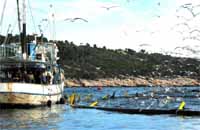|
On Sunday, 2 February, a local referendum on the island of Vis, Croatia, stopped a new tuna-farming project from taking off. The community’s response is the first of its kind in Croatia. WWF applauds the community’s and local NGO Sunce’s firm stand against an activity which is damaging the environment and decimating the already over-fished wild tuna in the Mediterranean.
Croatia is the leading producer of farmed tuna in the Mediterranean, after Spain. In 2001, Croatian production reached 3,000 tons from its eight farms*. A new tuna farming project was presented to the inhabitants of the island of Vis, in the Adriatic, as the only alternative for their economic future. When the community was invited to participate in a referendum on the issue, their vote was an emphatic "no" — 88 per cent of the voters were against the project.
“This is an important success in saving Mediterranean wild tuna. We strongly encourage similar actions to follow in other tuna-farming countries,” said Paolo Guglielmi, Head of the Marine Unit at the WWF Mediterranean Programme.
Tuna farming has drastically increased over the last few years in the Mediterranean and, with more than 11,000 tonnes produced in 2001**, the Mediterranean accounts for more than half of the world's total production compared to almost nothing five years ago. Increasing demand from Japanese markets for farmed tuna, which are higher in oil content making them particularly desirable for sushi, and very high selling prices have encouraged the development of tuna farming, regardless of its consequences on the environment.
Tuna farming puts additional pressure on wild tuna stocks, which are already over-fished. Unlike aquaculture, where fish are bred and reared in captivity, tuna farming uses fish captured in the wild. According to WWF, most of the tuna caught for farming, particularly in Croatia, are juveniles that will not be able to reproduce and renew wild stocks. Moreover, fattening practices result in organic pollution which threatens surrounding habitats.
In April 2002, a call for action was launched in Cartagena, Region of Murcia, Spain (the Murcian coast is the biggest producer of fattened captive tuna in the world) at a gathering of Mediterranean environmental NGOs concerned by the rapidly expanding tuna farming industry. Mediterranean NGOs had asked for a moratorium on the development of new tuna farms in the Mediterranean until the implications of this activity on the environment and particularly on the tuna stock are addressed at the international and national levels.
Although the European Union expressed concern on overfishing of tuna and on the necessary regulation of its farming when reforming its Common Fisheries Policy (CFP) last December, tuna farming still operates in the Mediterranean without regulation.
“This victory is a concrete application of the Mediterranean NGOs’ call for a moratorium. No further tuna-farming should be developed until proper management is applied. If no effective regulation is put in place, wild bluefin tuna will be commercially extinct from the Mediterranean Sea in the coming years,” added Paolo Guglielmi.
For further information:
Anne Rémy
Head of Communications, WWF Mediterranean Programme Office
Tel: +39 06 844 97 424
* Source : Croatian Ministry of Agriculture and Forestry, Dept of Fisheries
** Source : Fish Information and Services (FIS Int’l. Co. Ltd.) & DOTT Symposium
Top
|
